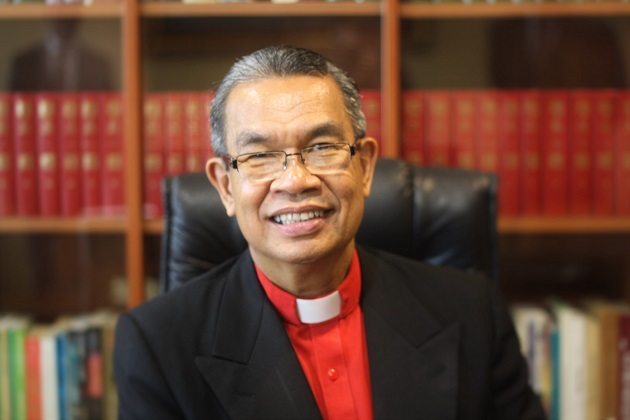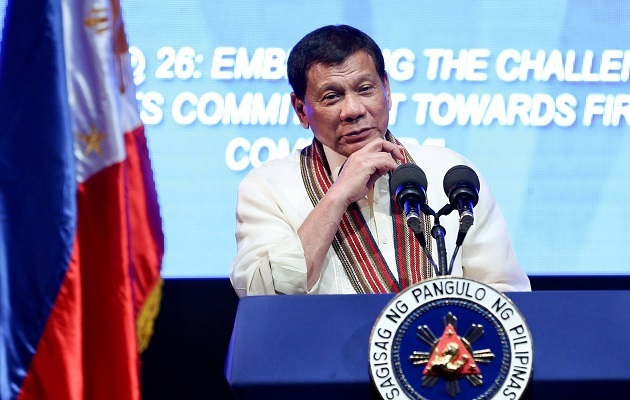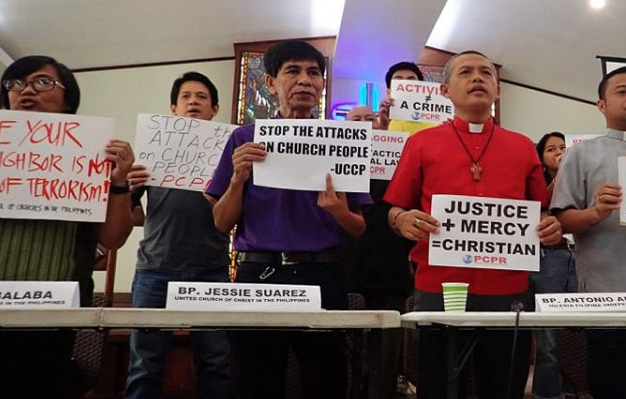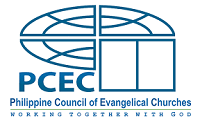An interview with Efraim Tendero, Secretary General of the World Evangelical Alliance and former leader of the Philippine Council of Evangelical Churches.
 Efraim Tendero, Secretary General of the World Evangelical Alliance. / Joel Forster, Evangelical Focus
Efraim Tendero, Secretary General of the World Evangelical Alliance. / Joel Forster, Evangelical Focus
The tensions between the President of the Philippines and the Catholic Church have caused international headlines.
In addition, an Islamist attack against a Catholic Church in Jolo killed twenty people and injured at least one hundred in January.
Evangelical Focus asked Bishop Efraim Tendero, the Secretary General of World Evangelical Alliance about how evangelical Christians should approach the situation in the country.
Bp Tendero is from the Philippines and served as the director of the Philippine Council of Evangelical Churches for 22 years.
Question. What are the reasons behind the verbal attacks of President Rodrigo Duterte against Christians in the Philippines?
Answer. Before I answer your question, let me share the lenses through which I look at the socio-political landscape of the Philippines. I look at our land and our people from a pastoral perspective. I see President Duterte as a human being created in the image of God and, because of this, I love him as a fellow human being. I pray for him as the Scriptures mandate us to pray for our national leaders.
I see four basic reasons behind his verbal attacks against Christians.
First, in December 2015, President Duterte admitted publicly that he was molested by a priest when he was young. I wonder if there was any psychosocial intervention or pastoral counselling that was offered to him as an expression of love and concern?
Second, the President perceives the Catholic Church as a major hindrance in his war against illegal drugs. In a speech last 5 December 2018 at the Malacanang Palace, Duterte accused bishops in this overwhelmingly Catholic nation of being useless for criticizing his administration: “These bishops of bishops, kill them”, Duterte said. “This stupid bunch serve no purpose — all they do is criticize”.
The Catholic Church is one of the most articulate and frequent public critics of President Duterte’s war on drugs. The January 2017 statement of the Catholic Bishops’ Conference of the Philippines partly says:
We, your bishops, are deeply concerned due to many deaths and killings in the campaign against prohibited drugs. This traffic in illegal drugs needs to be stopped and overcome. But the solution does not lie in the killing of suspected drug users and pushers. We are concerned not only for those who have been killed. The situation of the families of those killed is also cause for concern. Their lives have only become worse. An Additional cause of concern is the reign of terror in many places of the poor. Many are killed not because of drugs. Those who kill them are not brought to account. An even greater cause of concern is the indifference of many to this kind of wrong. It is considered as normal, and, even worse, something that (according to them) needs to be done.
Third, President Duterte, as demonstrated in his lengthy tirade against bishops and the Catholic Church, thinks that the opposition of Filipino Catholics is out of touch with the public pulse. True enough, Filipino Catholics have expressed public support of their bishops against their perceived attacks by President Duterte against their leaders.
 The President of the Philippines, Rodrigo Roa Duterte. / Facebook Rodrigo Duterte
The President of the Philippines, Rodrigo Roa Duterte. / Facebook Rodrigo DuterteQ. Is Duterte’s opposition to Christian churches just political or based on his personal worldview?
His opposition seems to be more psychosocial and political in nature. In one of his speeches, Duterte claimed: “I’m a Christian, and I believe in God. But no longer a Catholic”. So, there’s his worldview.
Q. As you already mentioned, Duterte said Catholic bishops should be “killed”. What effect do such words have in the cultural context of the Philippines?
A. He said that in a speech at the Malacanang Palace in Manila.
This is dangerous, given the fact that the chairman of the Philippine Commission on Human Rights, said the killing toll [of the war against drugs] could be “as high as 27,000, though he emphasised that investigating the deaths was complex because police withheld records on anti-drug operations.”
It seems that the culture of killing is now prevailing in our land. In his 12 June 2018 message at the Cathedral of Saint John the Evangelist in Dagupan City, Archbishop Socrates B. Villegas and his fellow religious workers condemned the killing of 44-year old Fr. Richmond Nilo, parish priest of St. Vincent Ferrer Church last June 10. Their message partly said: “Killing is the solution. Killing is the language. Killing is the way. Killing is the answer. Killing is encouraged. Killing is their job. Killers are rewarded. Killers boast of their murders. They kill in the streets. They kill inside homes. They kill in tricycles and jeeps. They kill in plazas. They kill in the malls. They kill in the chapels. The nation is a killing field. They kill everywhere. They are happy to kill”.
Q. Have the President’s strong words against Christians affected how the general society sees Christians?
A. As of September 2018, 70% of Filipino adults said they were satisfied with the President's performance and 16% were dissatisfied, for a net satisfaction rating of +54, graded as “very good” by the survey firm. Meanwhile, 14% were undecided.
Around 80% of the Filipinos are Catholics and about 10% are Protestants, including Evangelicals.
 Representatives of different religious organisations, asking for the end of the attacks against bishops and pastors . / NCCP, Mon Ramírez
Representatives of different religious organisations, asking for the end of the attacks against bishops and pastors . / NCCP, Mon RamírezQ. Should the international community ask responsibilities for these kind of statements?
A. We are one humanity. The international community should ask for these kinds of statements. I’m concerned, for example, with the fact that the Philippines is Asia’s deadliest country (and third deadliest in the world) for environmental defenders according to 2017 Global Witness Report on Killings of Environmental and Land Defenders.
I believe the family of nations must care for each other by speaking against all public articulation of evil intentions against human beings and all kinds of oppression-invoking statements against any people groups, especially against the poor. We all must speak for the rights and dignity of all human beings.
At the same time, small and less powerful countries like the Philippines must be discerning against the statements of global powers who tend to use human rights issues as an excuse for their regime change initiatives motivated by their geopolitical and resource-based interests.
Q. How are Christians in the Philippines responding? What has been the role of evangelical Christians in this conflict in the last weeks?
A. Christian churches are relentless in shouting for justice and crying for peace. Last 25 January, a big group of Christians, representing both Catholics and Protestants, along with justice and peace advocacy organizations, held a big rally in Metro Manila. A major paper reports: “Carrying placards displaying messages like ‘stop the killings’ and ‘the Church cannot be silent,’ various religious groups gathered in Manila on Friday to pray for ‘One Faith, One Nation, One Justice in the Philippines.’ Priests, nuns, missionaries, seminarians and members of evangelical churches… participated in the gathering at the Rajah Sulayman Plaza in Malate, Manila.”
 The Philippine Council of Evangelical Churches.
The Philippine Council of Evangelical Churches.The Philippine Council of Evangelical Churches (PCEC) are very vocal in their views on various issues affecting our people and our land. Here’s their latest statement regarding the bombing in Jolo:
We, the Philippine Council of Evangelical Churches (PCEC), as followers of Jesus the Prince of Peace (Isa. 9:6), decry in the strongest terms the brutal and heartless bombing of the Cathedral of Our Lady of Mount Carmel in Jolo, Sulu yesterday morning January 27, 2019, which sadly killed at least twenty persons and left dozens injured.
We at PCEC offer our most fervent prayers and deepest sympathies to the families and loved ones of the victims of this senseless act of violence. PCEC stands in solidarity with them in seeking justice and advocating for the responsible persons to be held accountable through all available legal measures.
In the light of the substantive gains of the Peace Process and the recent January 21 plebiscite, the bombing is clearly an attempt by lawless persons to subvert the majority’s will and the sincere desire of the Bangsamoro people for genuine peace, harmony, security and development in Mindanao. PCEC firmly believes this ruthless action does not in any way represent any religion or religious community to which the perpetrators may claim to belong.
It is thus toward making the true and noble intentions of the Bangsamoro people a reality that PCEC in this crucial time is issuing the following calls:
We respectfully call on our President Rodrigo Roa Duterte, as a “son of Mindanao” and our nation’s foremost leader, to defend to the utmost peace and order in Mindanao and our country through the enforcement of the law, and by bringing to justice those responsible for this reprehensible crime.
We call on all leaders of Muslim, Lumad (indigenous people) and Christian communities in Mindanao and in our country to work together in assuaging fears and prejudices that could arise in their communities from this act done by terrorists, whose ways do not reflect the beliefs and aspirations of the Bangsamoro people.
We call on all our Evangelical constituents to pray fervently and implore the Lord’s loving kindness so that genuine peace, justice and harmony will soon befall upon our beloved land.
“And the work of righteousness shall be peace; and the effect of righteousness quietness and assurance forever.” Isaiah 32:17 (KJV)
For the Philippine Council of Evangelical Churches:
Bishop Noel A. Pantoja
National Director
Philippine Council of Evangelical Churches (PCEC)
Philippine Relief and Development Services (PHILRADS)
January 28,2019
Q. The Islamist threat is another issue for Christians, as this recent attack against a Catholic cathedral showed. How should Islamism addressed in the Philippines?
A. We should engage them through the First and Greatest Commandment: Love God. Love our neighbours as ourselves. And neighbours include enemies.
Christians, specially Evangelicals, are engaged in active dialogue and cooperation with Islamic revolutionary leaders. For example, there has been an on-going peacebuilding cooperation between the Philippine Council of Evangelical Churches (PCEC) and the Moro Islamic Liberation Front (MILF) since 2008. This relationship started with an inter-faith dialogue then evolved throughout the years into a peace-and-reconciliation advocacy partnership.
Today, the peacebuilding partnership has been institutionalized and has been expanding in its scope and its influence among other religious groups.
Q. What does the World Evangelical Alliance think of the socio-political situation in the Philippines?
A. Like any other nation, the Philippines is suffering from various aspects of alienation: alienation from the Creator; alienation from their being—as humans and as Filipinos; alienation from their neighbours—as experienced both in their intra-national and international conflicts; and, alienation from the creation entrusted to them by the Creator—as indicated in many destructive exploitation of their natural resources.
World Evangelical Alliance is praying that the Philippines would experience healing and transformation—that is, spiritual transformation, psycho-social transformation, socio-political transformation, and economic-ecological transformation.

Las opiniones vertidas por nuestros colaboradores se realizan a nivel personal, pudiendo coincidir o no con la postura de la dirección de Protestante Digital.
Si quieres comentar o